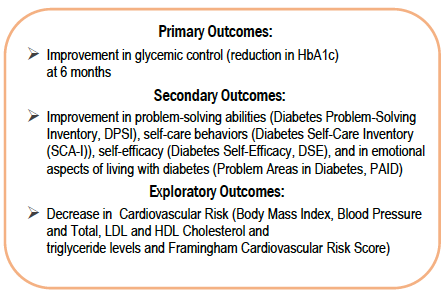Dynamically Tailoring Interventions for Problem-Solving in Diabetes Self-Management
Using Self-Monitoring Data – T2 Coach Project
Our preliminary research demonstrated that the proposed computational methods can reliably identify behavioral-clinical phenotypes, that the proposed expert system can use these phenotypes to generate personalized behavioral goals that are formulated in a way consistent with goals generated by Clinical Diabetes Educators (CDEs), and that individuals with T2DM recruited from economically disadvantaged communities can understand and follow personalized behavioral goals generated by T2 Coach.

In this project, Columbia University, Clinical Directors Network and Georgia Institute of Technology will develop and evaluate a new decision-support tool, T2 Coach which will facilitate problem-solving in diabetes using the T2 Coach Smartphone app to help individuals to keep track and review the past history of their behaviors (e.g., meals and blood glucose levels), and review and choose personalized goals that are consistent with their own preferences. Building on prior work that identified a set of strategies used by diabetes educators to foster diabetes problem-solving, T2 Coach will help individuals identify personally significant challenges in diabetes management, generate alternatives for removing these barriers, evaluate the alternatives through simple experiments, and monitor their outcomes.
PROJECT AIMS: Among the 288 participants recruited from 6 Federally Qualified Health Centers (FQHCs), this project aims to: 1) Further enhance the design of T2 Coach with multi-media educational modules and 2) Using a two-arm RCT with 1:1 randomization at the participant level, with stratified randomization to balance by clinical site, sex, and language, evaluate the efficacy of the T2 Coach intervention. To achieve this, half of the participants (n=144) will be randomly assigned to a control group and will receive standard diabetes education (SC). The experimental group will receive standard diabetes education, plus instructions on how to use T2 Coach for a minimum of 6 months. Achieving the above aims will facilitate the ability to investigate the next generation of informatics interventions that are grounded in theories of health behaviors, incorporate best available evidence for facilitating problem-solving in diabetes self-management, and take advantage of sophisticated modern technologies and data science methods to dynamically tailor behavioral interventions to each individual’s behavioral profile.
2024 Update: Standards of Care in Diabetes
2024 Update: Standards of Care in Diabetes
Presented by:
Arlene Smaldone, PhD, CPNP, CDCES, FAAN
Professor of Nursing and Dental Behavioral Sciences,
Columbia University School of Nursing
New York, NY
Glucometer Training – T2 Coach
Glucometer Training
Presented by:
Arlene Smaldone, PhD, CPNP, CDCES, FAAN
Professor of Nursing and Dental Behavioral Sciences,
Columbia University School of Nursing
New York, NY
288 participants (48 patients per site)
from 6 CDN-member FQHCs in
the New York Metropolitan Area.
This application brings together a multi-disciplinary research team led by Dr. Lena Mamykina, of the Department of Biomedical Informatics Columbia University, Clinical Directors Network, Inc. (CDN), an AHRQ Center of Excellence (P30) for practice-based research and learning, led by Jonathan N. Tobin, PhD and Georgia Institute of Technology.
Funded by:
The National Institute of Diabetes and Digestive and Kidney Diseases (NIDDK)
(Grant #1 R01 DK113189-01A1)
Principal Investigator – Lena Mamykina, PhD;
Co-Principal Investigator – Jonathan N. Tobin, PhD
Co-Principal Investigator – Arlene Smaldone, PhD, CPNP-PC, CDE, FAAN


